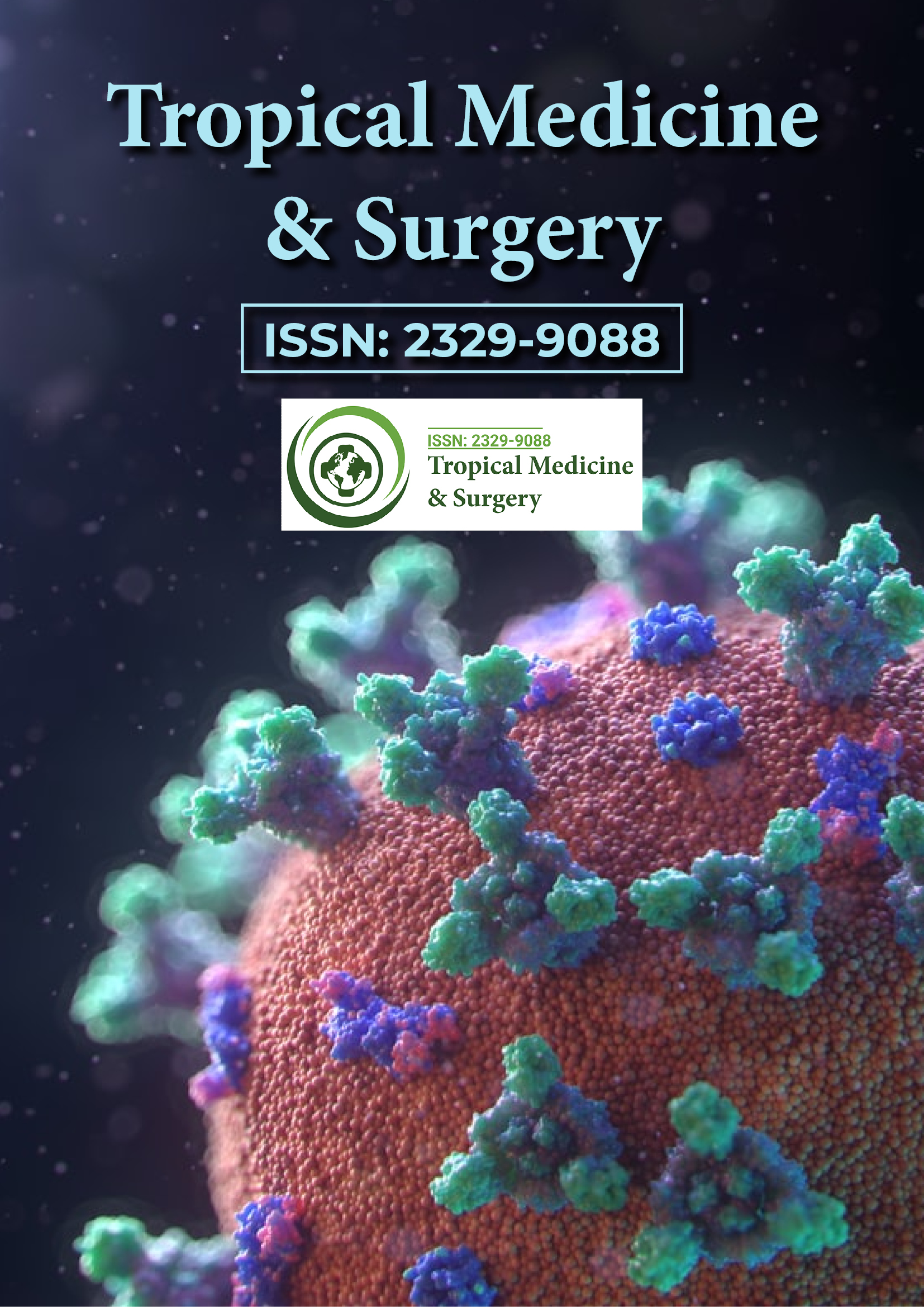Indexed In
- Open J Gate
- Academic Keys
- RefSeek
- Hamdard University
- EBSCO A-Z
- OCLC- WorldCat
- Publons
- Euro Pub
- Google Scholar
Useful Links
Share This Page
Journal Flyer

Open Access Journals
- Agri and Aquaculture
- Biochemistry
- Bioinformatics & Systems Biology
- Business & Management
- Chemistry
- Clinical Sciences
- Engineering
- Food & Nutrition
- General Science
- Genetics & Molecular Biology
- Immunology & Microbiology
- Medical Sciences
- Neuroscience & Psychology
- Nursing & Health Care
- Pharmaceutical Sciences
Short Communication - (2023) Volume 11, Issue 4
Role of Host Biomarkers in Plasmodium falciparum Malaria Acute Transmission Therapy
Yulia Jones*Received: 03-Jul-2023, Manuscript No. TPMS-23-22490; Editor assigned: 07-Jul-2023, Pre QC No. TPMS-23-22490 (PQ); Reviewed: 21-Jul-2023, QC No. TPMS-23-22490; Revised: 28-Jul-2023, Manuscript No. TPMS-23-22490 (R); Published: 04-Aug-2023, DOI: 10.35248/2329-9088.23.11.322
Description
Malaria caused by the Plasmodium parasite remains a major global health challenge particularly in regions with high transmission rates. Among the various species of Plasmodium, Plasmodium falciparum is responsible for the majority of severe and fatal cases. Early identification and prompt treatment of severe P. falciparum malaria are vital to reduce morbidity and mortality. In recent years, significant progress has been made in understanding host-pathogen interactions and identifying host biomarkers that can aid in the early detection and management of severe imported P. falciparum malaria. This article explores the role of host biomarkers in identifying severe P. falciparum malaria cases among imported cases, on their potential to revolutionize malaria diagnosis and treatment.
Severe malaria is characterized by clinical complications such as cerebral malaria, severe anemia, acute respiratory distress syndrome, and multi-organ failure. Imported cases, where individuals acquire malaria during travel to endemic regions and return to non-endemic areas, present unique challenges for diagnosis and management. Healthcare providers in nonendemic countries may have limited experience with severe malaria, leading to delayed recognition and treatment. Early identification of severe imported P. falciparum malaria is essential to prevent disease progression and improve patient outcomes.
Role of host biomarkers
Host biomarkers are specific molecules or indicators produced by the host's immune response in response to infection. These biomarkers can provide valuable insights into the pathophysiology of the disease and aid in early diagnosis. In the case of severe imported P. falciparum malaria, host biomarkers offer a non-invasive and rapid means of identifying patients at risk of developing severe complications. Host biomarkers are molecular, cellular, or physiological indicators that reflect the presence or progression of a disease. In the context of severe malaria, host biomarkers offer a non-invasive means to detect disease severity, predict complications, and guide clinical decisionmaking. By analyzing the host's response to infection can identify specific markers associated with severe disease and use them for early diagnosis.
Cytokines and chemokines: Inflammatory cytokines such as tumor necrosis factor-alpha (TNF-α), Interleukin-6 (IL-6), and Interferon-gamma (IFN-γ) play a vital role in the immune response to malaria infection. Elevated levels of these cytokines have been associated with disease severity. Additionally, chemokines like CXCL10 and CCL2 have been linked to cerebral malaria and severe disease outcomes.
Biomarkers of endothelial activation and dysfunction: Endothelial activation and dysfunction are central to the pathogenesis of severe malaria. Biomarkers like Soluble Intercellular Adhesion Molecule-1 (sICAM-1), Von Willebrand Factor (vWF), and Angiopoietin-2 (Ang-2) reflect endothelial activation and damage, providing insights into disease severity.
Hemoglobin and hematological markers: Severe anemia is a hallmark of severe malaria. Hematological markers such as hemoglobin levels, reticulocyte counts, and markers of hemolysis can help identify patients at risk of developing severe anemia.
Biomarkers of coagulation and Disseminated Intravascular Coagulation (DIC): Disseminated intravascular coagulation is a complication of severe malaria. Biomarkers such as D-dimer, thrombomodulin, and protein C are associated with coagulation dysfunction and can serve as indicators of disease severity.
Metabolomic and proteomic biomarkers: Advanced omics technologies have enabled the discovery of novel biomarkers associated with severe P. falciparum malaria. Metabolomic and proteomic profiles of infected individuals have revealed unique signatures that could contribute to early diagnosis and risk stratification.
Clinical applications and implications
The integration of host biomarkers into clinical practice offers several benefits for the early identification and management of severe imported P. falciparum malaria.
Rapid risk assessment: Host biomarkers can assist healthcare providers in quickly assessing the risk of severe disease in imported cases. This information can guide treatment decisions and ensure timely interventions.
Tailored treatment: Biomarker-guided approaches can help tailor treatment strategies to individual patients, optimizing the use of anti-malarial drugs and adjunct therapies.
Surveillance and monitoring: Host biomarkers can be used for disease surveillance and monitoring the response to treatment. Changes in biomarker levels over time can provide insights into disease progression and treatment efficacy.
Clinical trials and drug development: Host biomarkers can serve as valuable endpoints in clinical trials evaluating new anti-malarial drugs and interventions. They provide objective measures of treatment response and effectiveness.
Host biomarkers hold immense potential for transforming the early identification and management of severe imported P. falciparum malaria. By unraveling the complex host-pathogen interactions, these biomarkers offer a window into the underlying pathophysiology and can guide timely and targeted interventions. As evolves biomarker-based diagnostic tools have the potential to revolutionize malaria management, ensuring timely intervention, reducing disease burden and contributing to global efforts to eliminate this devastating disease. By integrating the power of host biomarkers into malaria control programs, we move closer to a world where severe malaria is detected early treated effectively.
Citation: Jones Y (2023) Role of Host Biomarkers in Plasmodium falciparum Malaria Acute Transmission Therapy. Trop Med Surg.11:322.
Copyright: © 2023 Jones Y. This is an open access article distributed under the terms of the Creative Commons Attribution License, which permits unrestricted use, distribution, and reproduction in any medium, provided the original author and source are credited.
